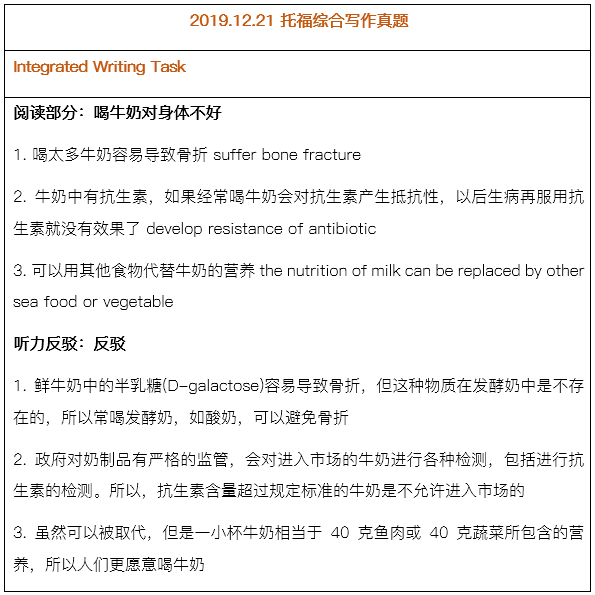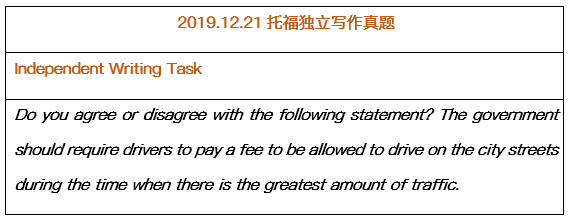

本次综合写作是一道新题,话题和人体健康相关。今年的综合写作中,有大量题目来源于历年真题,今年的最后一场考察的是新题,并且是并不常见的话题,有很多同学可能会有一些慌张。的确,在TPO中,有不少和环境或者生物学相关的学科话题,但针对人的健康话题相对来说还是比较少的,类似历年出到的较少的话题还有商业类和医学类,在今年的考试中都有出现过。这说明现在综合写作中大家需要积累的学科相关词汇更多了。
这一次的难点可能是在于听力中的个分论点出现了一个有机名词,然而在考试中,这个名词是有出现在电脑屏幕上的这在综合写作中的确比较少见,不知明年会不会再次出现综合写作中的生词提词小黑板,各位同学可以期待一下。如果需要在明年进行综合写作的备考,各位同学就需要更多地积累少见学科的词汇啦。
Key words: fracture, nutrition, resistance, antibiotic
可以类比下列TPO的综合写作:
2014年12月20日真题
阅读立场:水银不能用作补牙替代品的理由
分论点1:水银可能在咀嚼过程中溢出引起慢性中毒
分论点2:水银污染环境
分论点3:还有其他的替代品
听力立场:阅读中没有令人信服的论据
分论点1:咀嚼中释放的水银量很少
分论点2:有办法阻止填充的水银泄露到环境中
分论点3:水银比其他材料更物美价廉

题目解析:
11月17日的独立写作是一道老题,重复的是20070114CN和20080712CN的政府类。2019年独立写作一共52道,新题一共出现了19道,老题依然居多,今年的历年真题中,大多数取材自2016-2018年真题,只有10道题来自于2015年甚至更久以前。本次考试的题目便是今年重复的老题中资历最老的一道了。
关于政府类的题目,很多同学会觉得比较头痛,因为不知分论点构思如何入手,也不知论证细节如何扩充。事实上,政府类题目解题方法还是比较固定的,一般有两种方法:按城市生活的人口年龄分类,即学生、上班族、老年人;又或者政府题目的理由,即cost(成本), efficiency(效率), convenience(方便),environment(环境)。这道题两种解题思路都能用,分论点可以构思出很多,其实算是政府类中比较好写的一道。
此题为同意不同意类型,因此可以考虑全文2-3个主体段,明确选择一方立场,用一边倒或者2+1的结构进行全文写作。
请参考以下范文:
Traffic sucks nowadays. It hinders every major metropolitan center worldwide by producing honking and pollution. During rush hour, it is common to see the traffic system breaks down. Cities hit the “peak accumulation” of vehicles. Car drivers trying to turn from avenues onto streets have zero room; frustrated drivers block intersections and gridlock sets in. In order to solve this problem, the government has proposed a solution which is imposing fees from drivers, and I am a proponent of it.
First, not only would it alleviate traffic congestion, but also reduce carbon emissions. The overloaded traffic is responsible for environmental concerns to some extent. Charge of this kind will force drivers to take the shortest routes possible, and plan their drives more reasonable. Further, it may discourage tight-fisted drivers from going there – or maybe from driving at all. Thus, there will be more citizens choosing public transportation systems when they commute or travel, which would eventually decrease emissions. There are a few cities worldwide that already have this congestion pricing system in place, and it has brought notable results.
In addition, the government can spend the money it collects on projects that reduce congestion. In many metropolitan cities, for example, the government has employed the funds to improve the city’s subway and bus systems, which are in dire need of a cash injection. What’s more, some parts of the funds can also be invested in researching and developing the real-time traffic feedback system, which allows people to choose a more reasonable way to travel according to the traffic around the whole city. When the fees imposed can be taken full advantage of, congestion pricing, without doubt, is a cost-effective method that should be embraced.
It is true that congestion pricing has always been a tough sell politically. Most drivers don’t want to pay for roads that are currently free and the imperfect public transportation systems are being denounced by the citizens as well. However, I believe that the government has the ability to conceive a sophisticated charging system to not only work out traffic congestion but also satisfy the demands of all citizens.
To sum up, with regard to the way to deal with traffic congestion, I firmly contend that congestion pricing is an idea whose time has come.
英语高能高分·就上新航道 >>点击在线咨询<<
400-009-9696
预约试听
雅思/托福
A-Level
国际学校
能力英语
留学咨询
四六级/考研
日/韩/法/德语
微信客服

免费预约规划试听